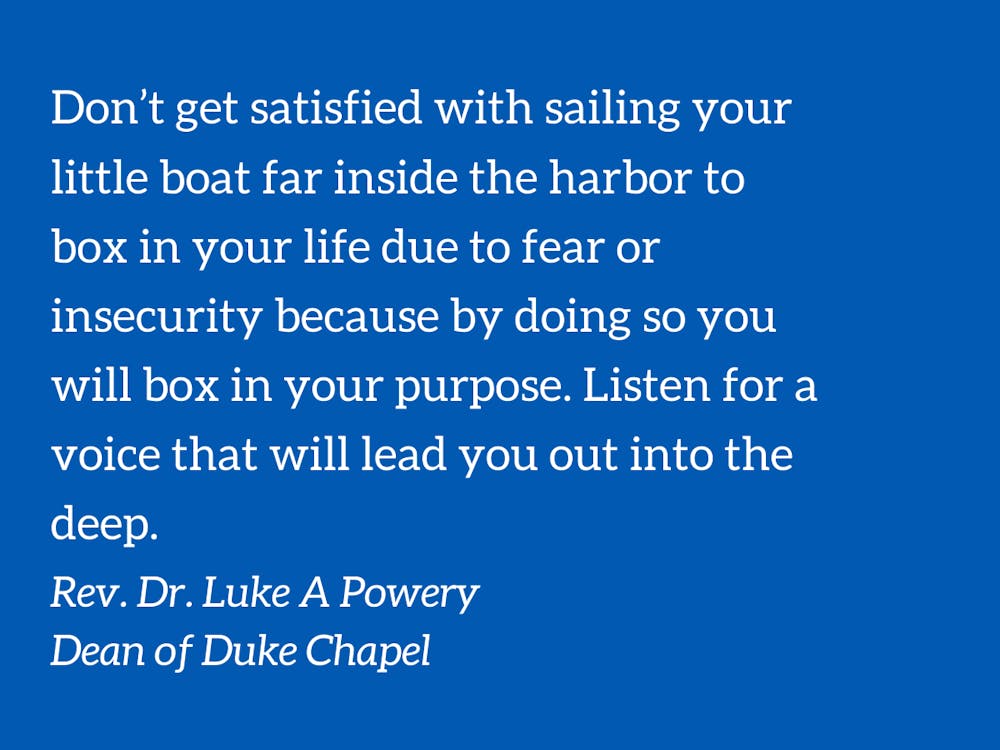There is what I call “a turn to the human” happening in academia. Universities across the nation, including Duke, have been altering their academic approaches by including in their curricular and co-curricular offerings themes related to the meaning and purpose of life. It is a trend that recognizes that students are more than heads on a pile of research papers, chemistry lab findings or the latest computer algorithms--they are whole human beings.
One consequence of this turn is an emphasis for students on discovering your “why,” your purpose, in the world. Why am I here? Why am I doing what I’m doing? Why am I doing what I’m doing in the way I’m doing it? Why am I doing what I’m doing where I’m doing it? Why am I doing what I’m doing now? These kinds of questions spark reflection on your own life and can cause you to slow down and see yourself pass by in the corridors of your mind.
Often, the topic of one’s purpose--especially within religious circles--is discussed in terms of finding your calling. A helpful example of discovering a calling comes to us from 2,500 years ago in the Hebrew scriptures when the prophet Jeremiah (“Jerry”) is called by God. It has lessons for us today.
Jerry wasn’t looking for a calling and didn’t even crowdsource a question on Twitter to discover it. Instead, Jerry’s calling begins when he hears the voice of God. This connection between calling and voice is seen in a related word—“vocation,” which comes from the Latin “vocare” meaning “voice.” In this sense, vocation is not about a goal I pursue but a calling or voice that I hear; it has to do with listening.
God begins by speaking very specifically to Jeremiah, saying, “Before I formed you in the womb, I knew you.” This is a key aspect of a calling: listen for a voice--out of all of the beautiful voices in the world--that is distinctly for you. There is only one you, so do you. Don’t let someone else’s life or dream become your goal when it was never your “why.”
Next, Jerry speaks back to God. This shows that vocation is not only about listening but also about finding your voice. Your purpose, your “why,” is also about speaking.
When Jerry speaks, he says, “Ah, Lord God! Truly I do not know how to speak, for I am only a boy.” Jerry is being honest and transparent when he says, “I do not know,” which may be true for anyone seeking purpose in their life. Discovering your voice or hearing your voice is an ongoing process and may include questions, struggles, and doubts. The process of living into your “why” is not necessarily a linear path but will most likely be a zigzag road.
But the kicker is when Jerry says, “I am only…” Our self-perception can get in the way of our promise as impactful human beings living flourishing lives. It can hinder our purpose. If you want to undercut your life, make insecurity an idol, and get in the way of what you are becoming, use that deadly phrase “I am only.” For Jerry it was, “I am only a boy” and he could not imagine beyond his little context. “I am only” means you don’t think too highly of yourself. “I am only” means you only see a lack in your life, deficiencies, and not your gifts and potential. “I am only a first-generation college student in my family. I am only from a small rural town of five hundred people with one stop light in it. I am only a first-year student.”
God replies to Jerry, “Do not say, ‘I am only a boy.’” I understand that response because that phrase—"I am only”—will constrict your life’s purpose and make you think or feel that you are smaller than you are. Don’t get satisfied with sailing your little boat far inside the harbor to box in your life due to fear or insecurity because by doing so you will box in your purpose. Listen for a voice that will lead you out into the deep.
Your ‘why,’ your vocation, your voice of purpose is bigger than what you can imagine. It can be viewed as, according to the modern American theologian Howard Thurman, “a crown placed over our heads that for the rest of our lives we are trying to grow tall enough to wear.” Your “why,” your calling, is beyond who you are now to who you are becoming—for the world. You might say, “I can’t,” but the voice calling you out into the deep waters of joyous purpose says, “Yes, you can.”
The Rev. Dr. Luke A. Powery is Dean of Duke Chapel. His column runs on alternate Mondays.
Get The Chronicle straight to your inbox
Signup for our weekly newsletter. Cancel at any time.

